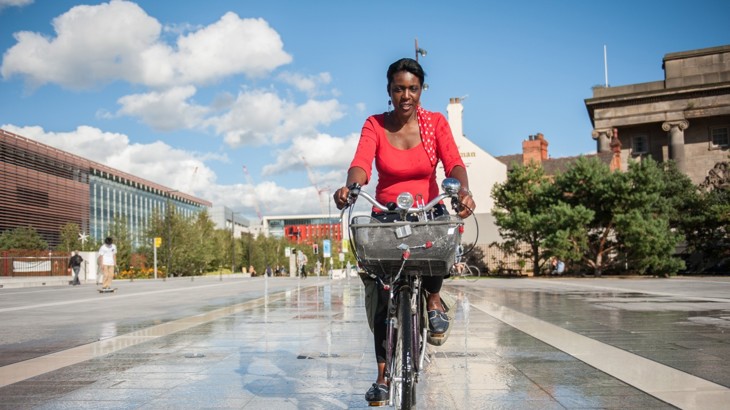Cycling has grown in popularity in recent years but women's cycling is still far from equal to men's. Megan Streb, Partnerships Manager at Sustrans sums up her experience of cycling on the roads and what can be done to encourage more women to ride their bikes.

There’s a lot to love about cycling in my city — I enjoy travelling into town through quiet neighbourhoods, being able to stop and chat if I see a friend walking past, and I like the small daily interactions with strangers I meet during the school run or taking their dogs out on a walk. It means I get parking right next to my destination, and I feel safer cycling at night than I do walking or being alone in a taxi.
I’ve cycled in heels and hiking boots, in skirts and in waterproof trousers thrown on over dresses, with and without a helmet. I try to cycle at a more leisurely pace to work so that I arrive looking professional and not ‘glowing’.
But there’s a lot more to be done to improve my cycling experience.
Recently, I’ve been thinking a lot about the #metoo movement; a hashtag used by women to highlight harassment that went viral. It was started after the Harvey Weinstein revelations hit the media. Having never been sexually assaulted, I felt like my voice didn’t matter, or that I would be insulting victims of sexual assault by taking part.
But like most (all?) women I know, I have stories about sexual harassment; unwanted advances in clubs, hearing catcalls shouted from passing cars and have considered my route home over and over again when it’s dark outside.
I see a lot of parallels with this and my experience cycling on the road.
I’ve never been in a collision, but motorists have whizzed past me in a tonne of metal with mere inches between me and the car. Drivers have honked to express their displeasure that I’ve played it safe and taken up more of the road so they can’t pass at an unsafe distance and often pull out right in front of me. The fact is, I’m all too used to this happening.
And the parallels don’t stop there. The victim blaming, the suggestion that it wouldn’t have happened if only they were wearing different clothing (whether that’s hi-vis or short skirts), or that the victims have no business being there in the first place. The realisation that lots of people are causing pain and discomfort without really thinking about the effect it has on other people. It all seems painfully similar.
The Sustrans’ report “Are we nearly there yet?: Exploring gender and active travel” pushes for changes within the transport industry instead of demanding changes from individual cyclists.
The report highlights that we need more women as transport decision makers and professionals, to build high-quality infrastructure that will give protection to women — and all the other cyclists who use it. And finally, we need to consider where we have existing inequalities in the system and work to change them.
Most of my day-to-day as a woman and as a cyclist is very positive. Lots of drivers in my neighbourhood join me in the polite ballet of moving around to let each other pass in narrow roads, raising a hand in thanks. Most of the men in my life are thoughtful, interesting people, ready to have a discussion down at the pub and treat me with respect as a colleague or friend.
But when so many people seem unaware that what they’ve always done can hurt others — whether it’s checking a text when driving or making a ‘well-meaning’ patronising comment in a meeting — we need to challenge the culture and change systems to give us more protection.
#PressForProgress isn’t just about making sure people don’t get hurt; it’s about changing the system so people thrive.

